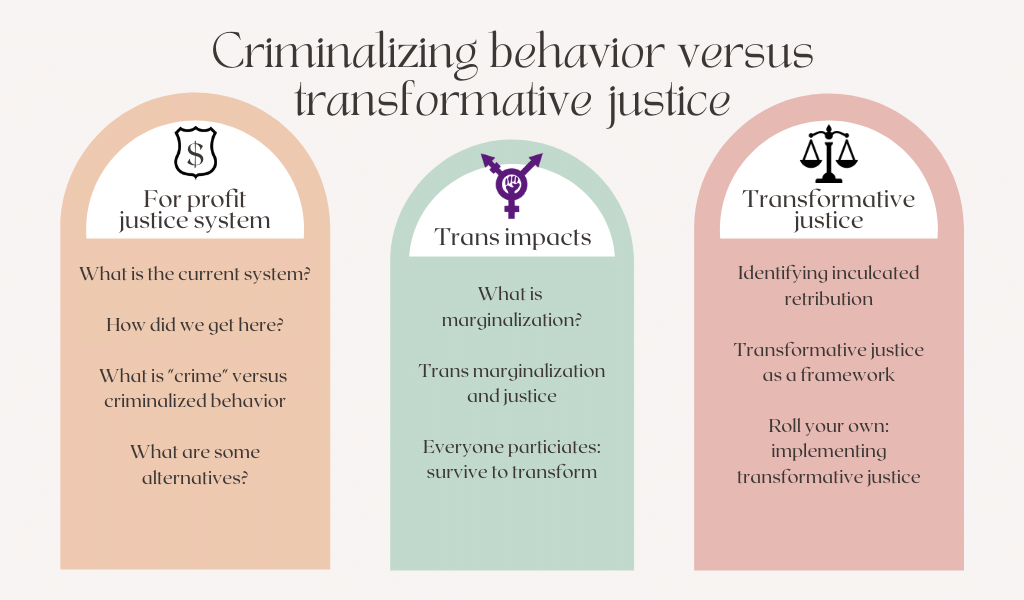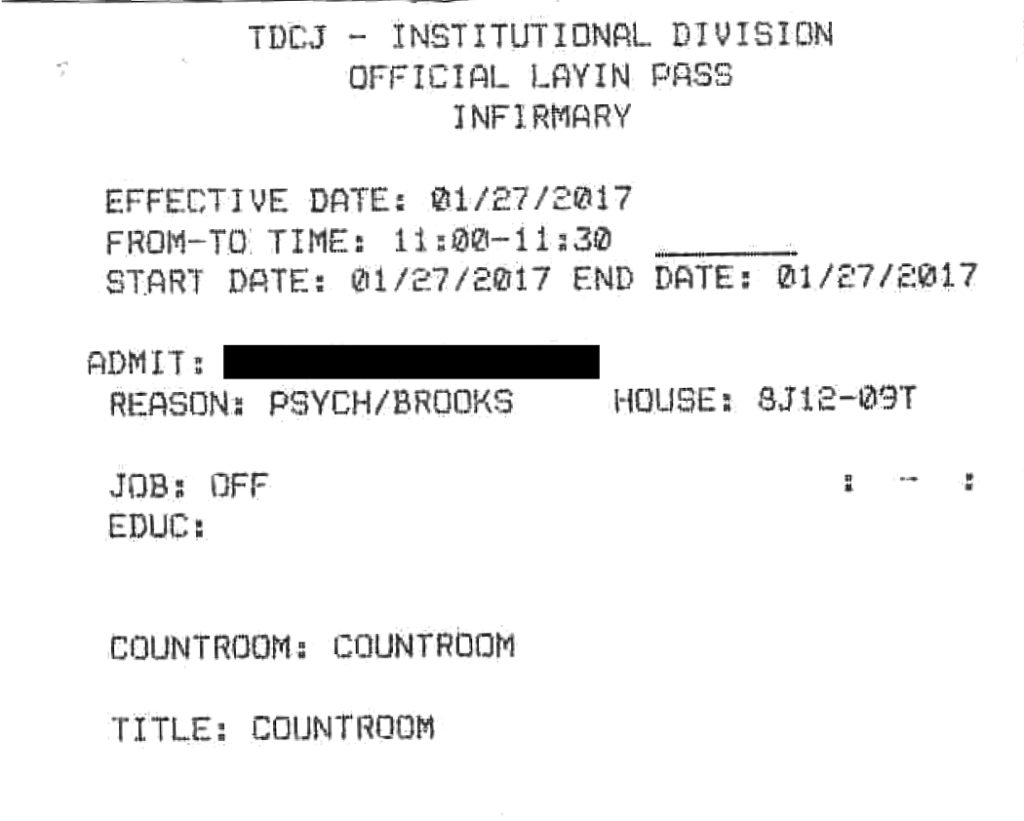In the TDCJ system, CMI stands for “Chronic Mentally Ill” and is often used to refer to the CMI-TP, or the CMI Treatment Program. The program was started in early 2019 (the official policy can be found here), and is claimed to offer additional assistance for persons dealing with certain mental health conditions. However, actual practice indicates it is a means of continuing to assign persons with mental health issues to what is essentially solitary confinement, which TDCJ claims to have eliminated, but which in practice continues under different names. A 2019 Texas Tribune article provides some more discussion of the program.
We don’t see this acronym often, but it is good to know about because when we do see it, it is usually just the “CMI” with no explanation of that that means.
Category: Prison services committee
This category is mainly a parent placeholder. Most posts will be a more specific category under this parent.
Prison terms: Lockdown
Lockdown usually refers to movement being restricted for everyone in a housing section, area, or an entire unit.
Most often, this refers to the twice-a-year search routine (in TDCJ—other agencies will have different practices) where nearly all movement is suspended. During the lockdown, all prisoner property is packed and searched for contraband.
Prison terms: SPD
SPD is an acronym we don’t see too often, but it’s good to be aware of this code. It stands for Security Precaution Designator, and you can see a little more about it here. Generally, an SPD indicates someone is a risk for escape or staff assault.
SPDs can impact eligibility for housing assignments and programs. We don’t know enough about these, and we are pretty certain there are other designators used in a less formal manner.
Prison terms: Heat Score
Civil suits concerning the summer heat in Texas prisons, and the negative health effects related to that heat, have resulted in work and living restrictions for prisoners sensitive to the heat.
Most of the time when someone says they have a heat restriction, they are referring to work heat restrictions. It is important to understand that these restrictions do not govern housing in temperature controlled areas.
After a suit (Cole v Collier, settlement here) concerning excessive heat was won against TDCJ, new policies were implemented, including a policy for setting a “Heat Sensitivity Score” (HSS, or heat score) for “Cool Bed Priority” prisoners. A discussion of this policy can be found in Sain v Collier here.
Persons who meet qualifications based on medical conditions and prescribed medications are to be given a heat score of at least one point (P01, no heat sensitivity would be P00). The conditions include:
- Heart and medical disease;
- Mental health disorders;
- Dementia and Alzheimer’s disease;
- Developmental disabilities;
- 65 years of age or older with certain conditions or prescribed certain medications.
The discussion in Sain v Collier here provides further specifics about these qualifications.
We don’t know as much as we need to yet about these heat scores and how they are being assigned, but we hope to learn more in the future. Currently, when someone is advocating for housing in temperature controlled areas, we are asking them to find out what their heat score is, which should be a code ranging from P00 (no heat score) to P05 (highest priority).
Prison terms: Line Class
You may see people incarcerated in Texas describe their line and custody class as something like G3/L1. G3 is the custody class, which we discussed last week. The L1 in this example is a line class.
Line class has to do with how one earns good time, which affects the amount of time one actually serves.
Line class ratings range from L3 (lowest, earning no good time) to L1. Most people enter prison at L1.
There are also S line class ratings from S4 to S2. The S is short for SAT, which means State Approved Trusty.
Line class is explained on pages 8 and 9 of the handbook published by TDCJ, but there is also a more simple overview at this Texas Criminal Appeals Blog entry.
Transforming justice: a trans empowerment necessity
Over the past several years, TPI has learned a lot about the justice system and how it impacts the trans community. Our experience began in efforts to work with existing justice systems. Those efforts included police and emergency responder training, working with system liaisons to report problems, advocating for system enhancements like hate crimes laws, and writing policy for both the Dallas sheriff and police.
But we saw our training used abusively as an excuse to claim discrimination doesn’t happen because “we have training.” We saw the police liaison refuse every effort at reporting discrimination and abuse and problem—not some, not most, but every single effort. We saw the sheriff try to cover up keeping a trans person in solitary confinement, which is nothing less that torture, for nine months and deny it until the abused person said she was willing to testify about it. That and pressure from the the Department of Justice helped us get the first trans policy passed within the Dallas sheriff’s office. However, we saw policy passed, but not enforced.
These experiences combined with ongoing communications with increasing numbers of incarcerated trans and queer persons, mostly in Texas, but some across the country, helped us learn the true colors of the “justice” systems as currently implemented. This work was eye-opening, and it prompted our interest in prison abolition, restorative justice, and more broad transformative justice work. We saw the routine abuses, and began documenting violence in a system set up not to rehabilitate in any way, but to simply extend what the justice system claimed was an initial violence with more violence performed under state operations for the profit of those in power.
Our experience led to reading and learning about a growing and evolving approach to social harm—actually a collection of approaches—known as transformative justice. Transformative justice is not a solution to social harm in the way that our current retributive justice is a solution that locks people away and hides the issues from the general public. Transformative justice is more a framework that identifies larger causes of social harm and address those while acknowledging immediate harms, seeking accountability from the person causing harm, and seeking support for the person experiencing harm.

Starting in 2022, TPI will be posting both short and long pieces about these topics in three main subject areas: 1) the system that we currently have and how we got here, 2) how this system adversely impacts trans and queer persons, and 3) culturing a transformative justice framework. These won’t be discussed in order, but we will always identify where the discussion fits in the overall collection. We hope some of these will be of interest, and will encourage you to learn more about the system we currently have, and how to help participate in moving us all forward toward a more humane concept of justice that actually reduces harm.
This work is necessary for trans liberation. It is necessary for the liberation and empowerment of all marginalized communities. If you disagree now, we hope you will join us in this journey exploring the topics, and eventually join us in the work. In solidarity.
Prison terms: Custody Class
Custody class can be a little complicated in TDCJ. Custody class is comprised of a two-character code, the first a letter that indicates three broad divisions, G for general population, P for safekeeping, and J for state jail housing. The second character is a number from 1 through 7. TPI mostly deals with general population and safekeeping custody levels.
G1/J1 indicates the least restrictive housing or custody level. Only G1 and J1 levels may be designated (there is no P1), and these allow housing in dorms outside the security fence and work outside the security fence.
G2/P2/J2 is sometimes called minimum security. Housing must be inside the security fence, but this is the least restrictive general classification.
G3/P3 is a minimum security classification that is only assigned to prisoners serving sentences of 50 or more years. There is no J3 custody class. G3/P3 can move to G2/P2 after 10 years.
G4/P4/J4 is a medium security classification that restricts most prisoners to living in cells rather than dorms.
G5/P5/J5 is also called close custody and is has maximum restricted movement. TDCJ claims this custody is for assaultive or aggressive prisoners, although what constitutes that assessment can be manipulated. They are confined to cells most of the day, and are to be escorted for out-of-cell movement.
P6/P7 are designations for a special protective custody or protective safekeeping. We don’t know a lot about these. P6 is a kind of minimum custody for protective safekeeping, and P7 is a kind of medium or close custody for protective safekeeping. P6/P7 are reserved for persons at extreme risk of violence inside the system, such as persons who have provided significant court testimony, persons previously employed in police and prison systems, and high-profile persons.
There are a number of things that custody level can impact, from recreation to visitation to how much one can spend on commissary. For more information, see the orientation handbook. Also available are policy documents in the TPI resources that include the TDCJ Classification Plan, Corrections Officer Manual, and other resources.
Something to look forward to
Writing to persons in prison helps people survive and improves mental health. If you would like to join our work, please consider joining our work!
Prison terms: LOP
LOP means Loss of Privileges. We don’t see this one too often, and so it can stump people when they do see it as it isn’t always clear from the context what this might refer to. An LOP generally is the result of a disciplinary case. Sometimes loss of privileges are also described as, for example, 45/45/45, which means 45 days loss of access to three types of “privileges” such as recreation, commissary, and out-of-cell time or access to certain property.
Prison terms: Lay-in
This is a very common term for an appointment with someone on staff, often administration or medical. Someone may say that they have a lay-in for their hormone injection every two weeks. The term can also refer to a small piece of paper called a Lay-in Pass that has the time, date, name, location, and other pertinent information about the appointment. We also see the term used to refer to a guard coming to escort them to the appointment. Someone might say they were supposed to talk to Safe Prisons, but they were “never laid in.” An alternate term for a guard escorting them is “pulled out,” as in being pulled out for a lay-in.
